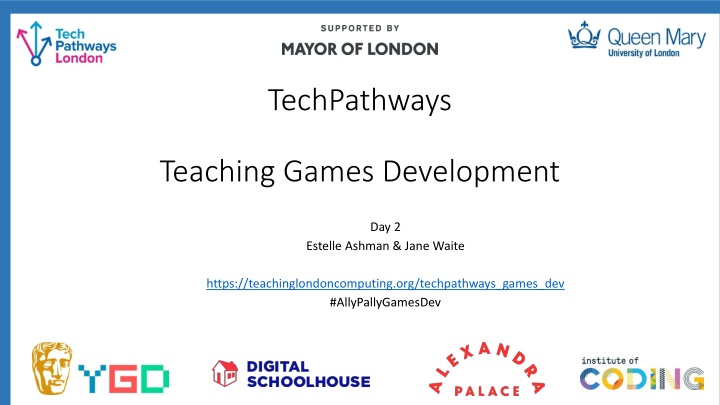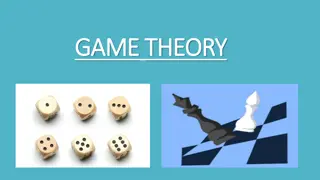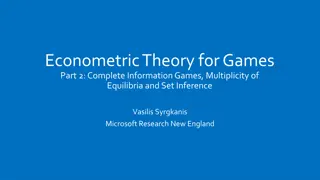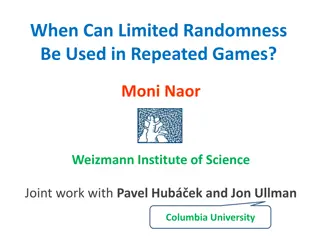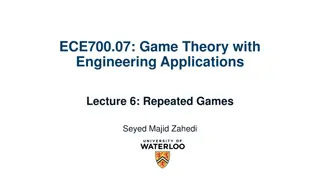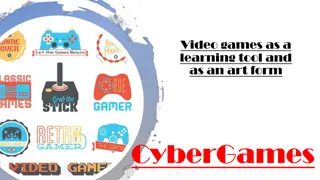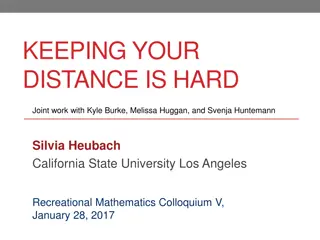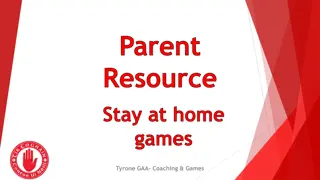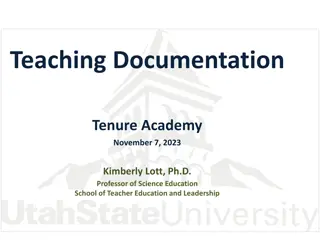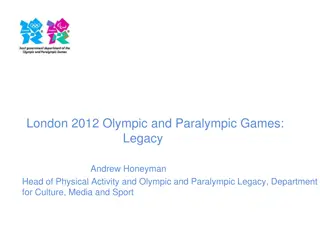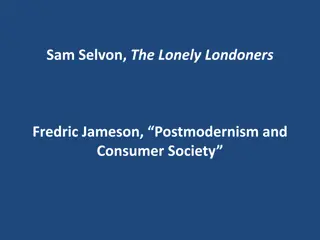TechPathways London: Games Development Teaching Workshop Highlights
TechPathways London offers a free CPD program for educators focusing on games development for 11-24-year-olds, featuring industry partnerships and diverse curriculum. The workshop includes sessions on pedagogy themes, teaching techniques, and research insights, emphasizing a balanced approach between constructivist exploration and controlled teaching methods. Join us to explore innovative instructional approaches and enhance your games development teaching skills.
Download Presentation

Please find below an Image/Link to download the presentation.
The content on the website is provided AS IS for your information and personal use only. It may not be sold, licensed, or shared on other websites without obtaining consent from the author.If you encounter any issues during the download, it is possible that the publisher has removed the file from their server.
You are allowed to download the files provided on this website for personal or commercial use, subject to the condition that they are used lawfully. All files are the property of their respective owners.
The content on the website is provided AS IS for your information and personal use only. It may not be sold, licensed, or shared on other websites without obtaining consent from the author.
E N D
Presentation Transcript
TechPathways Teaching Games Development Day 2 Estelle Ashman & Jane Waite https://teachinglondoncomputing.org/techpathways_games_dev #AllyPallyGamesDev
What is TechPathways London? Funded by the Mayor of London under the Digital Talent programme. Free CPD for educators of 11-24 year olds. Short courses and Depth courses Strong links to industry. Partnership between London CLC and Queen Mary, University of London. #AllyPallyGamesDev http://teachinglondoncomputing.org/techpathways_games_dev
Day 1 BAFTA/ YGD Games Design concept workshop OCR - iMedia delivery and good practise BAFTA/ YGD/ Ubisoft - Industry talks QMUL - Pedagogy themes Digital School House/ Scirra - Games Development with Construct 3. Optional QMUL Support for School Case Studies and Writing up QMUL/ BAFTA/Digital School House Industry visits Day 2
Days outline Day- Session 10:30 11:00 11:00 11:30 11:30 12:30 Arrival, registration, drinks Overview and Pedagogy themes Digital Schoolhouse Introduction to Construct 3, classroom set-up and creation of a basic game Lunch (now provided so shorter time!) 12:30 1:00 1:00 2:15 Creation of a more advanced game with details of how this links to the iMedia course Break More creation of advanced games Review of pedagogy, next steps and Q&A 2:15 2:30 2:30 3:10 3:10- 4:00 #AllyPallyGamesDev http://teachinglondoncomputing.org/techpathways_games_dev
Research and pedagogy themes for teaching games development Jane Waite
Objectives of this session Aim: Introduce pedagogical themes that will be useful for the teaching of games development and particularly that will be exemplified in the next session Learning objectives: 1. Know about Pedagogical Content Knowledge (PCK) 2. Know about Semantic Waves 3. Know about PRIMM (and the underlying theories) 4. Start to think about alternative instructional approaches RAG your current knowledge of each.
Teaching Games Development in Schools Limited research A recurrent theme across studies was a tension between constructivist exploration Jean Piaget constructionist making and a controlled progression of teaching There is concern about focusing on just one theory. Controlled teaching Exploration A blended approach is suggested from studies across contexts. (Waite, 2017)
In order to teach game development Content Knowledge Pedagogical Knowledge Assets Pedagogical Content Knowledge (PCK) Interactions, events and actions planning, progression, assessment, relationships, interventions, differentiation, inclusion, relevance, feedback, questioning, scaffolding, visualisations, active learning, direct teaching, discovery learning, resources Using algorithms Game play controls Hardware and peripherals Semantic waves, PRIMM . Adapted version of pedagogical content knowledge (PCK) (Shulman, 1986)
Semantic Waves Summary statement Example of a semantic wave in Biology teaching (Maton, 2013) Density meaning from technical (packed) to everyday meaning (unpacked) Gravity context - from theory to practical/personal context
Predict Run Investigate Modify Make Levels of Abstraction Code reading Block Model Examples Use Modify Create
Code reading, code tracing From university studies, code tracing is a pre-cursor to being able to write code. There is evidence that novices must be able to read 50% of their code (tracing code accuracy) before they can independently write code with confidence. (Lister, 2011)
B A D C
Task (problem) Levels of Abstraction Design (including the algorithm) Primary levels of abstraction framework (Adapted from Perrenet et al., 2005, Armoni, 2013 & Cutts et al. 2011, by Waite, Curzon, Marsh & Sentance, 2016, 2018) Code Running the Code (execution)
Predict Predict Predict Modify Make Run Investigate
Run Run https://scratch.mit.edu/projects/164 555770/#player Run Modify Make Predict Investigate
Investigate Investigate 1. What type of loop is being used? 2. What happens if you change the rotation style? 3. What will happen if you change the move 5 to move 500 ? 4. What if you change the change size to a positive number? What might this link to? Investigate Predict Run Modify Make
Modify Modify 1. Make the sprite appear from very far away move towards you. 2. Change the animal and its movement. Modify Make Predict Run Investigate
Make Make Task: Make a nocturnal animal scene. Task: Make a scene about your favourite animal s habitat Task: Make a scene about your favourite animal Make Modify Predict Run Investigate
Four models to situate next session PCK Semantic Waves PRIMM Make Predict Modify Run Investigate Other instructional approaches
Controlled teaching Exploration
Objectives of this session Aim: Introduce pedagogical themes that will be useful for the teaching of games development and particularly what will be exemplified in the next session Learning objectives: 1. Know about Pedagogical Content Knowledge (PCK) 2. Know about Semantic Waves 3. Know about PRIMM (and the underlying theories) 4. Start to think about alternative instructional approaches RAG your current knowledge of each.
References and further reading Armoni, M., 2013. On Teaching Abstraction in Computer Science to Novices. Journal of Computers in Mathematics and Science Teaching, 32(3), pp.265 284. Cutts et al., 2012. The abstraction transition taxonomy: developing desired learning outcomes through the lens of situated cognition. In Proceedings of the ninth annual international conference on International computing education research. ACM, pp. 63 70. Available at: https://doi.org/10.1145/2361276.2361290. Lee, I. et al., 2011. Computational thinking for youth in practice. ACM Inroads, 2(1), pp.32 37. Available at: https://doi.org/10.1145/1929887.1929902. Lister, R., 2011. Concrete and other neo-Piagetian forms of reasoning in the novice programmer. In Proceedings of the Thirteenth Australasian Computing Education Conference-Volume 114. Australian Computer Society, Inc., pp. 9 18. Maton. K., 2013. Making semantic waves: a key to cumulative knowledge-building. Linguistics and Education 24, 8-22 (2013). Papert, S., 1980. Mindstorms: Children, computers, and powerful ideas, Basic Books, Inc. Perrenet, J., Groote, J.F. & Kaasenbrood, E., 2005. Exploring students understanding of the concept of algorithm: levels of abstraction. ACM SIGCSE Bulletin, 37(3), pp.64 68. Available at: https://doi.org/10.1145/1151954.1067467. Piaget, J., Cook, M. & Norton, W., 1952. The origins of intelligence in children, International Universities Press New York. Sentance, S. & Waite, J., 2017. PRIMM: Exploring pedagogical approaches for teaching text-based programming in school. In Proceedings of the 12th Workshop on Primary and Secondary Computing Education. ACM, pp. 113 114. Sentance, S., Waite, J. & Kallia, M., 2019. Teachers Experiences of using PRIMM to Teach Programming in School. In Proceedings of the 50th ACM Technical Symposium on Computer Science Education. ACM, pp. 476 482. Shulman, L.S., 1986. Those who understand: Knowledge growth in teaching. Educational researcher, 15(2), pp.4 14. Waite, J. et al., 2016. Abstraction and common classroom activities. In Proceedings of the 11th Workshop in Primary and Secondary Computing Education. ACM, pp. 112 113. Available at: https://doi.org/10.1145/2978249.2978272. Waite. J,. 2017. Pedagogy in teaching Computer Science in schools: a literature review (After The Reboot: computing education in UK Schools). Online. (November 2017). Retrieved July 24, 2019 from https://royalsociety.org/-/media/policy/projects/computing-education/literature-review-pedagogy-in-teaching.pdf Waite, J., Curzon, P., Marsh, D., et al., 2018. Abstraction in action: K-5 teachers uses of levels of abstraction, particularly the design level, in teaching programming. International Journal Of Computer Science Education In Schools.
